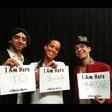Activism and BDS Beat 10 September 2016

Artwork in solidarity with Standing Rock and the water protectors. (Leila Abdelrazaq)
Palestinians are expressing support for the Standing Rock Sioux Tribe in their months-long resistance to the US government’s plan to install an oil pipeline on their land.
“The people of Palestine supports you and all those standing with you right now in North Dakota to protect your tribal lands and resist the desecration and destruction of your sacred burial sites at the hands of the Energy Transfer Partners corporation and the Dakota Access Pipeline they are building,” the Palestinian BDS National Committee said on Friday.
In another statement issued on Friday, individual Palestinians around the world say they “recognize the multitude of ways that Native American and First Nation struggles to protect indigenous territories have ultimately been struggles on behalf of all of humanity.”
Their full statement is below.
The Dakota Access Pipeline, which was approved by the US Army Corps of Engineers, is planned to run under the Missouri River, a natural water supply for the tribe.
The pipeline would also run through sacred areas of Sioux land not recognized by the US government as part of the Standing Rock Sioux Reservation.
“When we look at Standing Rock, we also see the attempts of authorities with a still-prevalent colonial mentality to vilify, criminalize and ultimately disappear indigenous people on their own land,” the BNC said. “The Palestinian people have firsthand experience with a colonial power desecrating our burial sites, destroying our indigenous communities, appropriating our culture and otherwise gradually erasing our centuries-old heritage.”
The BNC, the largest Palestinian civil society coalition that leads the global boycott, divestment and sanctions movement, referred in particular to Israel allowing the US-based Simon Wiesenthal Center to build a so-called “Museum of Tolerance” on top of Mamilla Cemetery, destroying a Muslim burial ground and holy site in Jerusalem that historians date to the seventh century.
On Friday, a US federal court ruled against a request filed by the Standing Rock Sioux Tribe to stop construction of the pipeline.
However, in what the Sioux call “a stunning move,” three federal agencies say the Army will “not authorize” construction of the pipeline in one area until the government “can determine whether it will need to reconsider any of its previous decisions” regarding construction on tribal land.
“This federal statement is a game changer for the tribe and we are acting immediately on our legal options, including filing an appeal and a temporary injunction to force [the Dakota Access Pipeline] to stop construction,” the Standing Rock Sioux said.
The tribe was never consulted about the matter before the plan was approved by the Army Corps of Engineers, which the tribe says violates US law.
G4S, which contracts with Israel to incarcerate Palestinians, admits it is one of several private security companies working to guard the pipeline.
Activists at Sacred Stone Camp, a flashpoint of protests, say that resistance is growing.
Security firms protecting the pipeline have used dogs and pepper spray to attack protesters.
Palestinians around the world have signed this statement of solidarity with the Standing Rock Sioux Tribe.
Statement of solidarity with the Standing Rock Sioux tribe
We the undersigned Palestinians – artists, academics, activists, elders, laborers, musicians, authors, businesspersons, attorneys, students – hereby declare our unqualified and heartfelt solidarity with the Standing Rock Sioux Tribe in their epic struggle to protect what remains of their ancestral lands, waters and sacred sites.
As an indigenous people whose lands have been robbed and pillaged, and who face existential settler-colonial expansion in Palestine, we recognize that Native American and First Nation peoples have endured centuries of violent settler colonialism that has dismantled and robbed them of home, heritage, dignity, security, narrative, land, language, identity, family, trees, cemeteries, animals, livelihoods and life.
We recognize the multitude of ways that Native American and First Nation struggles to protect indigenous territories have ultimately been struggles on behalf of all of humanity to save the Earth we share from toxic globalization of neoliberal and capitalist ethos that threaten our collective survival.
We also heed the wise leadership of a people who first conceived of mountains and rivers as sacred, who look upon a prairie with reverence, who consider trees as family and who risk their lives to protect the water and the integrity of their ancestral lands.
With respect, love, solidarity and hope,
- Leila Abdelrazaq, author and artist
- Rabab Ibrahim Abdulhadi, senior scholar, Arab and Muslim Ethnicities and Diasporas Studies, SFSU
- Rinad Abdullah, human rights and international law attorney
- Tarek Abuata, executive director, Friends of Sabeel North America
- Susan Abulhawa, writer
- Ahmad Abuznaid, human rights attorney and organizer
- Iyad Afalqa, Vice-chair of Arab American Caucus of CA Democratic Party
- Ghada Ageel, University of Alberta, Canada
- Lena Alhusseini, executive director of the Arab American Family Support Center
- Enas I. aL-Muthaffar, film director and producer
- Dina Alzeer, journalist
- Issa Amro, human rights activist, Youth Against Settlements in Hebron
- Lamis Andoni, journalist
- Iman Annab
- Huwaida Arraf, civil/human rights attorney and activist
- Mariam Arraf, Detroiter
- Hanan Ashrawi, PLO Executive Committee
- Sa’ed Atshan, academic
- George Awwad, human rights activist
- Hana Awwad
- Zeina Azzam, writer and educator
- Sam Bahour, Palestinian-American writer, businessperson and activist
- Rana Baker, student and journalist
- Mariam Barghouti, activist and writer
- Ramzy Baroud, journalist and author
- Iyad Burnat, Bil’in Popular Committee
- Diana Buttu, human rights attorney
- Shirien D.
- Wafai Dias
- Lamis Deek, human rights attorney
- Azzam Elder, attorney
- Nazmi Elder
- Shareen Elder
- Joeseph Elder
- Jasmine Elder
- Laila Elhaddad, author, activist and journalist
- Reem El-Khatib, humanitarian
- Ismail El Zabri
- Philip Farah, co-chairman, Washington Interfaith Alliance for Middle East Peace
- Reem Farah, CCD
- Hala Gabriel, filmmaker and activist
- Tamar Ghabin
- Budour Hassan, writer
- Zaha Hassan, human rights lawyer and writer
- Thayer Hastings
- Taher Herzallah
- Saleh Hijazi, human rights activist
- Gus Hussein
- Ramzi Jaber
- Nour Joudah
- Alaa Juma
- Andrew Kadi, steering committee of US Campaign to End the Israeli Occupation
- Remi Kanazi, poet and organizer
- Hanna Kawas, journalist and activist
- Tanya Keilani
- Suhad Khatib, artist and community organizer
- Noura Khouri, writer and activist
- George Khoury, Nakba survivor
- Samia Khoury, Palestinian elder, author, and university trustee
- Nerdeen Kiswani, NYC Students for Justice in Palestine
- Amr Madkour
- Dalell D. Mohmed
- Yousef Munayyer, executive director of US Campaign to End the Israeli Occupation
- Jumana Musa, human rights attorney
- Izzaddine Mustafa
- Khalil Nakhleh, PhD, Palestinian anthropologist, researcher and author
- Lois Nakhleh, botanical artist
- Tania Tamari Nasir, singer/writer
- Amira Nassim, student
- Mary Nazzal-Batayneh, barrister and activist
- Ali Omar, activist and academic
- Mazin Qumsiyeh, professor and director, Palestine Museum of Natural History
- Fadi Quran
- Tareq Radi, artist and student
- Beesan Ramadan
- Tamara Reem, human rights attorney
- Nadia Saah
- Samah Sabawi, poet and activist
- Mahdi Sabbagh, architect and urbanist
- Steven Salaita, scholar and writer
- May Seikaly
- S.R. Shafie RPh.
- Dina Shana’a, US Palestinian Community Network
- Halla Shoaibi, assistant professor of law, Birzeit University
- Samee Sulaiman, PhD student
- Sandra Tamari, St Louis Palestine Solidarity Committee
- Steve Tamari, educator
- Karimah Tarazi, RN BS MFA
- Randa Wahbe
- Maysoon Zayid, comedian and disability advocate
- Hurriyah Ziada
- Raya Ziada
Editor’s note: This list has was updated on 14 September.




Comments
the hour of need
Permalink tom hall replied on
Once again, Palestinians reach out in solidarity to peoples facing oppression, expropriation and cultural genocide. Now ask yourselves, to whom is Israel reaching out in like fashion? The Saudi royal family, the leading arms manufacturers, and the United States Treasury.
Thank you for your support. I
Permalink Joyce keahbone replied on
Thank you for your support. I am of the Kiowa nation. You touch my heart with your bravery. Many many thanks. We are all waking up. Stay strong and pure.